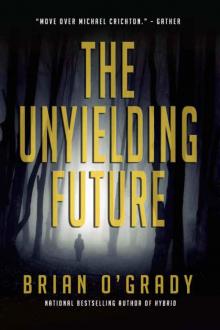- Home
- Brian O'Grady
The Unyielding Future Page 5
The Unyielding Future Read online
Page 5
They exchanged a very subtle glance that seemed to communicate that Sharpe would take it from here. “Do you remember what happened after this?” Once again the screen was tapped, this time by Sharpe.
I blinked in confusion. “I ran some more.” Apparently that was the wrong answer, as both men shifted in their seats.
“The two cameras that gave us these images went blank for nine minutes just as you approached the intersection. Do you have any idea why or how that would happen?” Sharpe’s tone was now purely professional and accusatory.
I blinked in confusion, again. “Was Richard Nixon around?” I smiled, but my attempt at nervous humor only bounced off of their stony faces. “I really have no idea,” I said, but it was clear both Sharpe and Willis had an idea that didn’t involve the late former president.
Sharpe turned the laptop back to himself and hit more keys. I could hear the hissing from the computer that told me he had hit the playback button. After several seconds he turned the screen back to me. “Do you know what that is?” He pointed at a zoomed image from the gas station. It was a quart-sized red bottle two to three hundred feet past the Circle C intersection.
“My PowerAde bottle. I put it there before I started to run that morning, but I’m guessing you already know that. That’s my turnaround point; usually I pick it up and drink from it on the way back.” A sudden realization hit me, but before I could explain Sharpe had changed the image.
“Isn’t that your PowerAde bottle again?” It was, and the video’s time stamp was more than an hour later.
“I blew by it on Friday, and when I realized that I had already passed it I just kept going. I had planned to pick it up on my way home.” This looked bad and I knew it, but it was the truth. I didn’t remember that I had left the bottle until two days later when I was dropping off another bottle and found Friday’s still on the curb.
“So you went to all the trouble of dropping off a bottle only to run right past it, and then you forget to pick it up later.”
“What does this prove except that I get forgetful when I run?” I remember getting more than a little defensive at this point. “Do you think I would leave a bottle on the curb just before I went and kidnapped a baby?”
“I’m not thinking anything, Doctor. I’m trying to understand what happened that morning, and these videos and that bottle of PowerAde are just about all we have to go on.” Sharpe answered my defensiveness with aggression.
“Then that child has a problem.” Now I was being aggressive. A tense moment followed.
“Do you know either John or Brittany Dale?” Sharpe finally asked, in a more civil but still hyper-professional tone.
“No,” I said flatly, correctly assuming John and Brittany were the baby’s parents.
“You’ve never been to their house?”
“Not that I know of.” I managed to control my temper but not my frustration.
“You used to live in Circle C.” I nodded and for a moment considered asking them to leave so I could call a lawyer. The fact that they had already researched my background sent a cold shiver down my back. “So it would be reasonable to assume that you were familiar with the area the Dales now reside in?”
“No, it would not be reasonable to assume that,” I snapped back. Although I didn’t know it at the time, John Sharpe knew very little about south Austin and less about Circle C.
“You once lived a mile from their home; surely you would have run by their house at least once.” It was all so obvious to him.
“No, I did not live a mile from them, ever. That section of Circle C was built three years after we left.” I wanted to add, Take that, you unprepared flatfoot! But I thought better of it; I still had a tiny remnant of respect for the police at that point.
My “gotcha moment” rocked both men. Willis immediately wrote something in his small note pad, and Sharpe had an unintentional, brief look of surprise. He recovered well but subtly retreated back into his chair. “I see.” He nodded and tried a different approach. “Whoever took Maggie had to learn the routines of her parents, which means that they had to know how to blend in and not arouse suspicion. Somebody who runs a lot could do that.”
“I don’t run that much.” I said but they appeared unconvinced. It was at this point that Detective Sharpe abruptly changed his line of questioning and asked about Adis. I covered that exchange a couple of chapters earlier, so I’ll skip to the end.
“I would gather Adis either took the knife from one of the terrorists or brought it himself.” As a reminder, Sharpe had just asked me where I thought Adis had gotten the knife he used to kill two of the Northland High School terrorists. I tried to keep the squeamish feeling out of my face, as I said earlier the thought of stabbing two men with the same knife was somewhat disconcerting.
“He did indeed take it from one of the terrorists. A man probably fifty years younger than him.”
He waited for a response, but I really had nothing to say. Yes it was odd, but we already knew that the entire situation was odd. I tried to get us back on point. “What does any of that have to do with me or the kidnapping of this child?” I was flustered at this point, and I’m certain that was the intent of the rapid-fire questioning and the abrupt segues. My adrenergic nervous system was fully engaged (translation, my adrenaline was flowing, although technically it wasn’t), which caused my pulse to race, my face to flush, and my IQ to drop about fifty points.
“We’re not sure yet.” Sharpe paused an instant and I felt another abrupt segue coming. “So, having never met the Dales, you would not know that they were both police officers?”
“No, I didn’t know.” This was really becoming tiresome, and again I thought of calling my lawyer.
“That makes Maggie Dale one of our own, and we take care of our own.” He didn’t need to complete his thought; his message was loud and clear.
“Are you trying to intimidate me in my own office?” I was on my feet now, seeing red. I can’t remember my exact words, but our interview had come to a sudden and none-too-pleasant end. My next clear memory is of standing in my waiting room with my office staff asking me what just happened as the two detectives walked to their car. “Assholes,” I said out loud. I rarely swear and never at work, but this was a special occasion. “Don’t let them in again unless they have a warrant,” I ordered as I turned back to my receptionist but found Adis instead.
Chapter Five

 The Unyielding Future
The Unyielding Future Hybrid
Hybrid Amanda's Story
Amanda's Story